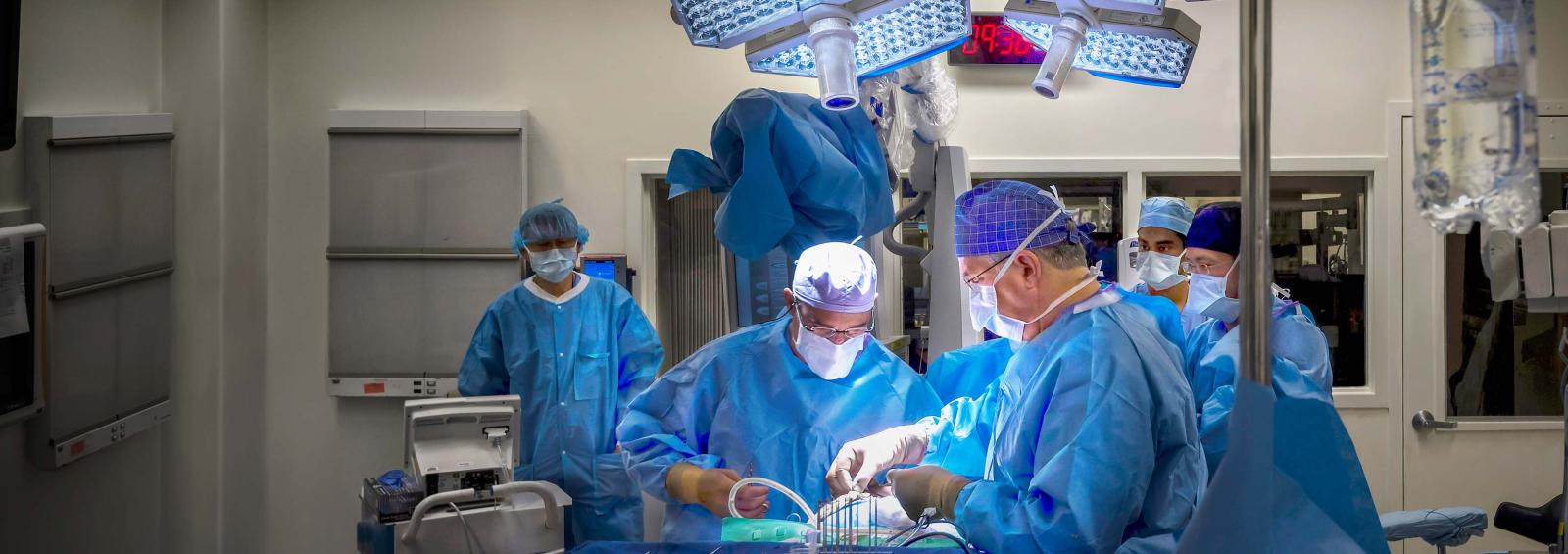About the Department of Neurosurgery

In the Department of Neurosurgery at NYU Langone Health, we are dedicated to putting patients first. When care is optimized, training and research will also be of the highest quality.
This approach has allowed our department to be a leader in the field of academic neurosurgery for more than 60 years.
History of Neurosurgery at NYU Langone
In its nearly 70-year history, the Department of Neurosurgery at NYU Langone has attracted leaders in the field, provided exemplary training, and developed cutting-edge innovations to improve the lives of patients.
The department was established in 1951 by Thomas I. Hoen, MD, who in addition to being a superb surgical technician was an accomplished cabinet maker and musician. Dr. Hoen attended medical school at Johns Hopkins University and completed his training at the Peter Bent Brigham Hospital in Boston and the Royal Victoria Hospital in Montreal. He then served as professor of neurology and neurosurgery at New York Medical College, Flower and Fifth Avenue Hospitals.
Upon joining NYU School of Medicine in 1951, Dr. Hoen established the academic Department of Neurosurgery and initiated a formal training program in neurological surgery. When he retired in 1962, he was succeeded by Joseph P. Ransohoff, MD, who was recruited from Columbia College of Physicians and Surgeons. Dr. Ransohoff earned a fine arts degree from Harvard University before attending medical school at the University of Chicago and completing his training at Montefiore Medical Center and Columbia College of Physicians and Surgeons.
Dr. Ransohoff had a wide array of scientific interests, including head and spinal cord injuries, and subarachnoid hemorrhage and vasospasm. He was particularly interested in intracranial tumors, including their surgery and the use of postoperative adjuvant therapy. He developed a large neurosurgical referral practice that concentrated on brain tumors.
Dr. Ransohoff instilled in his residents an ethic of hard work, honesty, and curiosity. He also supported the work of other individuals who have remained and flourished in the Department of Neurosurgery at NYU Langone, including Jeffrey H. Wisoff, MD; Anthony K. Frempong-Boadu, MD; and Vallo Benjamin, MD. In 1992, Dr. Ransohoff retired after 30 years as chair of the Department of Neurosurgery.
In 1993, Patrick J. Kelly, MD, was recruited from the Mayo Clinic to be the Joseph P. Ransohoff Professor of Neurosurgery and chair of the department—a post he held until 2008. Dr. Kelly was interested in the surgical treatment of brain tumors, as well as glial tumor biology and minimally invasive approaches to intracranial neoplasms using computer-assisted stereotactic methods. Among other advances, Dr. Kelly brought to NYU Langone the computerized, interactive, minimally invasive surgical techniques he had developed earlier in his career and refined at the Mayo Clinic.
Under Dr. Kelly’s leadership, computer-assisted, endoscopic, robotic, and neuroaugmentative techniques continued to evolve through collaboration with other clinical services and with the faculties available in the engineering, computer science, and robotics facilities at NYU Langone. Drawing on his experience at the Mayo Clinic, Dr. Kelly also helped improve the efficiency of medical care delivery systems in New York City.
John G. Golfinos, MD, was named the fourth chair of the Department of Neurosurgery in January 2009. A member of the NYU Langone faculty since 1995, Dr. Golfinos was recruited by Dr. Kelly from the Barrow Neurological Institute in Phoenix—where he was trained by Robert F. Spetlzer, MD. He was brought to NYU Grossman School of Medicine to expand the school’s brain tumor and skull base practice.
Dr. Golfinos’s principal clinical interests include the treatment of vestibular schwannoma (acoustic neuroma), gliomas, and metastatic brain tumors, and he has published and lectured nationally in the field of neuro-oncology. Under his leadership, the department has continued to solidify its reputation as a leader in brain, skull base, vascular, spinal, epilepsy, and pediatric neurosurgery, while also pioneering new capabilities in minimally invasive surgery and neuromodulation and expanding its clinical and basic research activities.
From our midtown Manhattan location, doctors in the Department of Neurosurgery care for a multi-cultural population of patients, allowing trainees to learn from a wide range of clinical cases. Our faculty and residents provide neurosurgical services for four inpatient facilities: NYU Langone’s Tisch Hospital and Kimmel Pavilion; NYC Health + Hospitals/Bellevue; and the Manhattan campus of the VA NY Harbor Healthcare System.
Endowed Professorships
Endowed professorships are tremendous gifts to the Department of Neurosurgery at NYU Langone Health, as well as New York University. These funds work to actively support the research work of the professor who holds the endowment. These funds also allow the individual to focus their work in a specific area of interest, and provide the freedom to explore novel therapies and new scientific insights. Our department continues to seek such endowments for all faculty members.
We are proud to host the following endowed professorships:
- The Gray Foundation Chair of Neurosurgery, held by John G. Golfinos, MD
- The Lucius N. Littauer Professor of Neurosurgery, held by Howard A. Riina, MD
- The Bergman Family Professor of Skull Base Surgery, held by Chandra Sen, MD
- The Gray Family Professor of Neurosurgery, held by Douglas Kondziolka, MD
Medical, Scientific, and Educational Leadership
Our physicians play an active role in professional medical societies, and scientific and educational organizations.
Dr. Golfinos is currently the president of the North American Skull Base Society. This organization includes members from multiple disciplines including neurosurgery, otolaryngology, plastic surgery, and ophthalmology, and serves to advance the clinical care and research for patients who have disorders of the skull base.
Dr. Kondziolka serves as the president of the American Academy of Neurological Surgery, an invitation-only organization of the top academic neurosurgeons in North America. The mission of the organization is to support strong neurosurgical science and collaboration, provide financial support to superb young investigators, and serve as the research voice for neurosurgery. Membership is one of the most significant accomplishments of a neurosurgical career.